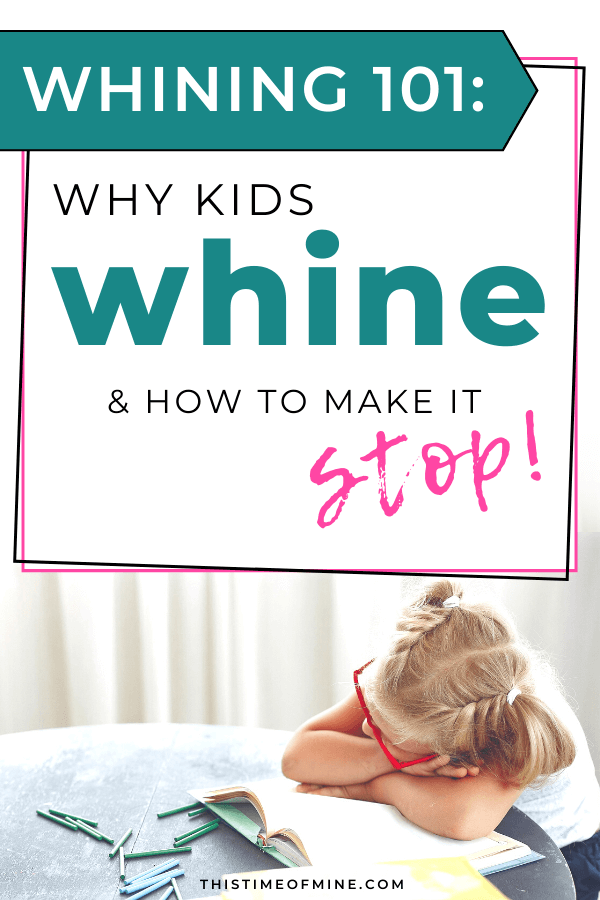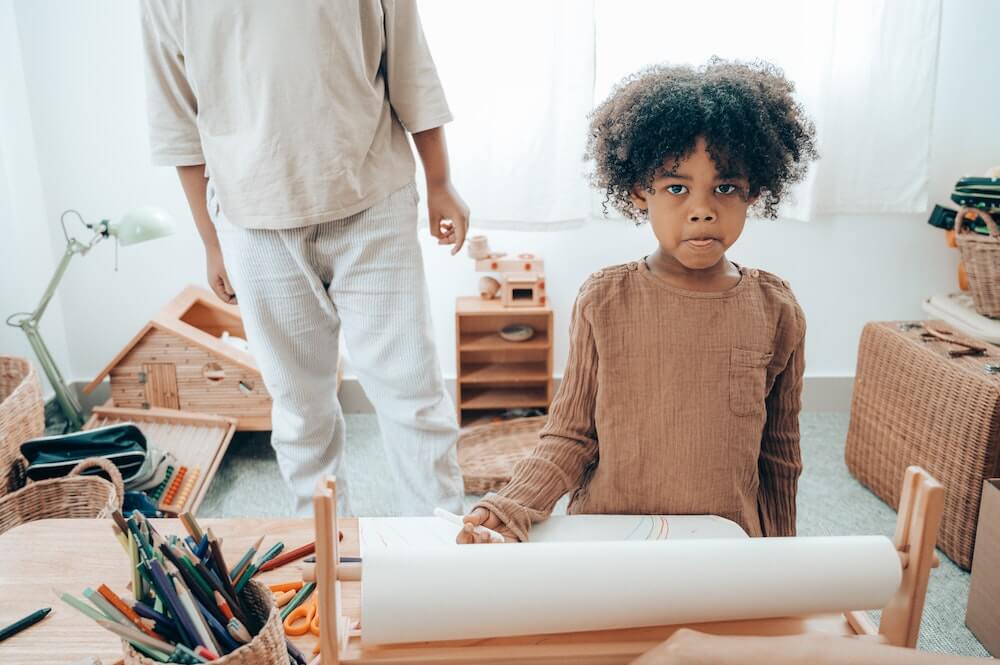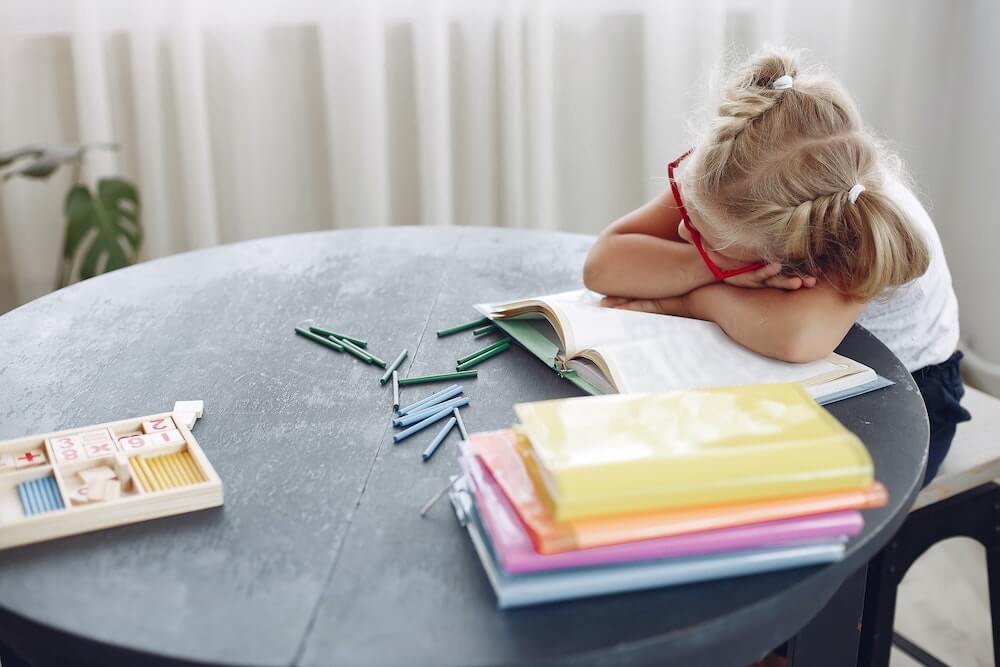Whining 101: Why Kids Whine And How To Make It Stop
Dealing with whining lately? Find out the real reasons why kids whine along with some sure-fire ways to make it stop for good!

When it comes to parenting, we win some, we lose some, right?
We try to be patient, but sometimes it’s just so hard. We all have triggers that make us tense up and force us to practice all the self-control we possess.
For me, it’s whining.
When my kids whine, it’s not always as loud as a smoke alarm, but it triggers the same natural response. The type where I panic and want to do anything I can think of (good or bad) just to Make. It. Stop.
Whining is simply the worst. And it turns out, I’m not the only one who thinks so.
It’s been scientifically proven that when kids whine, it physically affects us. So it’s no wonder that it drives us crazy!
Well, similar to ripping a smoke alarm off the wall in a panic reaction, lashing out at our kids might make stop things temporarily. But it leaves a little damage.
So what else can we do?
Well, let’s start with a little background information.

WHY DO KIDS WHINE ANYWAY?
That’s easy…because it works!
From toddlers to teens, whining is very effective. It’s no wonder it can become a habit so quickly.
But whining isn’t a natural behavior – it’s learned. They whine, we react. It’s a vicious cycle.
When kids whine, what they really want is our attention. Even negative reactions are better than being ignored. So they’ll test every boundary they can until they figure out the best way to use their new power.
And unless we know how to combat it, we give in and reinforce the behavior.
(Be sure to scroll to the end for some powerful phrases to use instead of “Stop whining!”)
THE POWER OF CONNECTION
This post is going to outline 7 specific strategies you can use when your kids whine. But in order for them to be used effectively, we have to address the one thing we can do that has the biggest impact – meaningful connection.
Remember, the underlying cause of whining is the need for our attention, which is why there’s great power that comes from finding time to connect with our kids.
When we look for brief moments throughout the day to put our responsibilities aside and simply be with our kids, the results will be incredible.
Now, you might ask, “Isn’t there such a thing as too much connection? I don’t want to spoil my child into thinking they can’t play without me.”
Absolutely not!
It’s impossible to spoil your child with love. We can spoil them with things, but we can never spoil them with time and love.
Of course, we need to set healthy boundaries. After all, we have things to do! That’s why I believe so strongly in teaching kids to play independently. It’s good for them and helps us get things done!
But connection? We can’t ever have too much of that.

HOW TO STOP WHINING IN ITS TRACKS
Ok, now that we’ve determined why kids whine, let’s talk about how we can stop it before it drives us absolutely crazy. Here are 7 strategies you can start using right away to put an end to this dreaded behavior:
1. “Nope, try again.”
Whining works, right? Well, in order to make it NOT work, stop them before they can get any further.
Remain neutral and simply tell them something like, “Sorry, that’s not how we ask for a drink. Try again.”
If they don’t know how, use this time to teach how you expect them to speak. Then keep at it until they ask without whining.
2. Ignore it…sort of.
The goal here is to ignore the behavior, not the child.
Let them know that you won’t listen or help them when they whine, but that you will as soon as they speak correctly. If needed, remind them how you want them to sound.
Don’t be afraid to cover your ears (lightly) or walk away to show them you’re serious.
3. Just say no. Then say it again.
When we stop giving in to whining, our kids will keep at it until we do. Until they learn that we’re sticking to our guns, that is.
Decide beforehand that when you say no, you’re going to follow through. No matter what.
4. Watch your words.
“Stop whining!”
That’s my smoke alarm reaction. I want it to stop.
But if someone told me to calm down or stop whining when I was being grumpy…well, let’s just say, it wouldn’t end well.
Our kids are the same way.
(Scroll down for some phrases you can try instead.)
5. Alone time, anyone?
This has been one of the most effective strategies for my family.
When whining, complaining or even bickering start happening, have your kids spend some time alone. Set a timer and tell them to pick a spot in the house along with a quiet, scree-free activity.
It’s the perfect way to reset. (This works for grownups too!)
6. Get down.
This is another powerful way to establish connection and help kids snap out of the whine.
Get down to their level, make eye contact, and let them know they have your full attention. Sometimes, this alone can be enough to get them to speak correctly.
7. Look for the signs.
Sometimes, kids will whine no matter what you do. They might be tired, hungry, overstimulated, or not feeling good. They might also need a sensory outlet.
In this case, make sure those needs are met before addressing the behavior.
As you start to notice patterns that lead to whining, you’ll be better prepared to catch it before it starts.
BONUS: Remember to reward the good
Don’t forget praise! Positive reinforcement goes a long way.
Did they make an effort to change their attitude? Did they finally ask correctly?
Whatever the case (and however small the improvement), point it out! Let them know that you noticed and are proud of them so you can start seeing more of it.

POSITIVE PHRASES TO USE WHEN KIDS WHINE
Parenting is a little easier when we have tools to use. So here are some powerful alternatives to “Stop whining!” that you can start using immediately:
- “I bet you need a big hug.”
- “You’re getting so big. I bet you’re old enough to use your regular voice now.”
- “I can’t wait until you can say it without whining. I really want to hear what you have to say.”
- “It’s not that I don’t want to help you. I just can’t until you use your regular voice.”
- “When you use that voice, I’m going to leave the room. Please let me know when you’re ready to use your respectful voice so I can hear you.”
- Say nothing. Just walk away.
- “You’re trying so hard to get your shoes on. That must be frustrating.” Talk them through the process and finish with, “Wow, you did it all by yourself!”
- “I know how you feel, that makes me mad too.”
- “It’s ok to be sad about leaving. We can come back another time.”
- “I see that you’re upset about the ice cream. You really want it, but it’s not good for our bodies to have too much.”
- “Tell me about it. I’m listening.”
- “It’s ok to be scared. I’m right here.”
- “I know you’re tired, and I’m sorry.”
- “Ouch. That sound hurts my ears. Can you try again?”
- Use humor. Hand them a cup and say, “Could you please go pour out your whine and bring back your regular voice?”
SO, TO SUM IT ALL UP
When kids whine, what they’re really asking for is attention. And they’ll take it however it comes, good or bad.
So make it good by remembering the power of connecting with our kids throughout the day.
But despite our best efforts, kids will still occasionally whine, because it works! So make it STOP working, make your expectations clear and no matter what – be consistent.
Of course, this is hard to do when we’re feeling overwhelmed. Luckily, there are 3 simple things that will make it easier to stay in control. Get them in The Peaceful Parent Starter Guide – a free guide you can get here.
Now it’s your turn…Do you have any tricks for dealing with whiny kids (or adults)? Let me know in the comments!
OTHER HELPFUL POSTS:
- How To Keep Your Cool Kids Won’t Listen
- Do This, Not That! 10 Powerful Alternatives To Yelling
- 5 Simple Ways To Discipline Without Yelling
want to remember this?
PIN IT TO YOUR FAVORITE BOARD
Share this article:




My daughter has hit 5 years old and everything is “why”, I don’t want too” or my favorite “ you can do it momma I don’t feel like it”, I just simply say I need yo take a breath would you like to breath with me? Sometimes it works but sometimes the whining doesn’t stop.